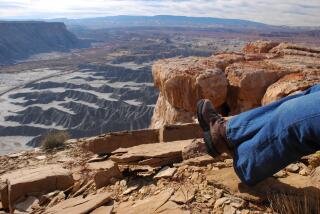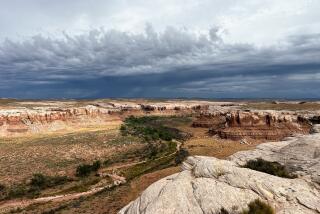‘Reform’ Bills for the Round File : Environmental legislation is a cover for reckless land-grabs
When members of Congress return from recess this week, they will confront a stack of land-grab legislation thinly disguised as “environmental reform.” Held over from last year, these bills are not unlike the stale remains from a raucous party the previous night--best swept away quickly. Will House leaders do that or will they persist in efforts to breathe legislative life into the reckless ideas and special-interest giveaways that motivate these bills?
During its first year, the new Republican majority made rollback of long-standing federal environmental protections a legislative priority. Yet by year’s end, they could claim only modest accomplishments. (Changes in federal timber laws that permit cutting of old-growth trees, even those standing and viable, under the so-called “salvage” exemption, is a notable and sorry exception.) Why so few victories? Pollsters and moderate GOP members in the House and Senate have discovered that Americans are uncomfortable with the wholesale assault on environmental regulations, the slashing of agency budgets and the effort to sell off irreplaceable public lands to the highest bidder.
But no matter, say a group of die-hard lawmakers still pushing to pass a handful of bills that largely serve the interests of a small group of corporations and users. A roll call:
* HR 1745: This bill would open nearly 4 million acres of Utah’s breathtaking Red Rock wilderness to development, including mining, and undercut the federal government’s obligation to manage an additional 16 million acres as wilderness. Recreation and solitude will take a back seat to logging, mining and road construction.
* HR 2032: Under this measure, all lands held by the Bureau of Land Management would be offered to the states in which they are located. The bill binds states that accept title to BLM wilderness lands to manage them in accordance with federal law. But once title transfers to the states, the federal government will have no power to enforce this mandate. Moreover, language in some state constitutions may direct management for maximum return to the state, opening the way to uses incompatible with recreation and wildlife preservation.
* HR 2081: This “Rights-of-Way Settlement Act” would direct the federal government to cede title to private rights of way across hundreds of millions of acres of federal land. The burden of proof would rest entirely on the Department of the Interior to disprove private right-of-way claims. If it fails to do so, or fails to act quickly, title transfers. At least 5,000 such claims are pending in Utah and Alaska. As a result, portions of these millions of acres could transfer to private property owners who claim them by virtue of having cut snowmobile or off-road vehicle trails.
Americans have little stomach for such vast land giveaways and see no compelling need. Congress would be wise to turn its attention in a more constructive direction.
More to Read
Sign up for Essential California
The most important California stories and recommendations in your inbox every morning.
You may occasionally receive promotional content from the Los Angeles Times.










